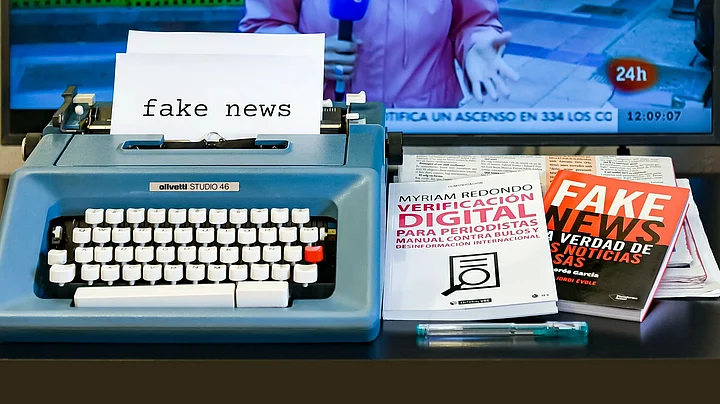On Thursday, 24 February, Russian President Vladimir Putin announced a “special military exercise” in certain parts of Ukraine, which later turned into a war against Ukraine that has claimed over 2,000 civilian lives, as per Ukraine’s state emergency service.
Since then, graphic, tragic, and emotional visuals have flooded news and social media platforms – ranging from children confronting soldiers to heavily damaged buildings – in real time. While these social media platforms have aided information flow out of Ukraine even with interrupted internet and television broadcasting services, they have also bolstered rampant flow of misinformation related to the conflict.
Fact-checkers around the globe have been actively working to verify and debunk content surrounding Ukraine, be it tales of heroic Ukrainian ace pilots to possible disinformation spread by Russia.
The overwhelming flow of information coming out of Ukraine has misled many, including media organisations, leading to misreporting. Adding to this problem, some of these visuals have been shared by Ukraine’s official authorities as well.
One popular example of the same would be that of the ‘Ghost of Kyiv,’ that talks about an ace pilot from the Ukrainian Air Force who is said to have taken down six Russian jets by themselves.
While reports regarding this ‘Ghost’ have been unverified and are likely to be an urban legend, the Ukrainian government’s verified Twitter account shared visuals created on a combat simulator in a compilation commending the ‘Ghost.’
The Quint’s WebQoof team has also debunked several such claims, including incidents of the media airing old or simulated visuals of explosions and aerial combat.
Fact Checkers and Disinformation Experts See New Narratives, High Volume of Information
Though there are claims that have done the rounds across the globe, country-specific narratives have also emerged. For instance India saw social media posts with claims such as Putin personally meeting and addressing evacuated Indians and making statements about India having the right to claim disputed territories as its own.
But that’s just one country. How could one possibly keep track of all the misinformation going around?
Jiménez Cruz, CEO and co-founder of Maldita.es, a Spanish news non-profit newsroom that works to combat disinformation, saw that fact-checkers across the world were debunking similar claims in various countries, according to Poynter.
His team contacted the Poynter’s International Fact-Checking Network (IFCN) and invited fact-checkers to enter the information about their debunks in a spreadsheet.
This collaborative effort, of which The Quint's WebQoof team is also a part, can be easily accessed and browsed on ukrainefacts.org.
“We know that when fact-checkers collaborate among themselves, the work is much more effective and we can also gather better information about which kind of disinformation is circulating,” Cruz told Poynter.
As fact-checkers follow the same code of principles, it saves time for their peers as they do not have to duplicate their efforts for the same claim, Cruz added.
Netherlands-based investigative journalism collective Bellingcat’s Giancarlo Fiorella told Canada’s CBC News that this flood of content has kept fact-checkers busy.
He pinned the challenge of verifying information surrounding Russia and Ukraine on its volume. “Just the sheer quantity of events that they’re flooding social media with, there’s so much of it,” Fiorella told CBC News.
A Possible Russian Disinformation Campaign
Owing to the evident rise of propaganda and disinformation, the United States Department of State issued a press release on Thursday, 3 March, designating 26 individuals and seven entities under Executive Orders (EO), which deal with foreign entities and sanctions, as they were “associated with Russia’s global disinformation campaign” and “spread disinformation and ultra-nationalist propaganda for the Russian Federation.”
The Department also released a fact-sheet that clarifies fact versus fiction in the narratives spread by the Russian government in January earlier this year.
Ben Strickland, the director of investigations at the Centre for Information Resilience, a London-based non-profit that studies and monitors disinformation campaigns noted that he has “seen a shift” in the kind of propaganda that Russia disseminates, reported NBC.
While older campaigns sought to blame NATO and western countries for the tension in Ukraine, there has been a shift where the campaigns directly targeted Ukraine, accusing it of harbouring neo-Nazis and fascists, Strickland said.
He told NBC that his team had started seeing the use of specific keywords such as ‘Ukraine aggression’ from 14 February, and the same narrative was echoing across Russian social media and state-affiliated media outlets.
(With inputs from CBC News, NBC and Poynter)
